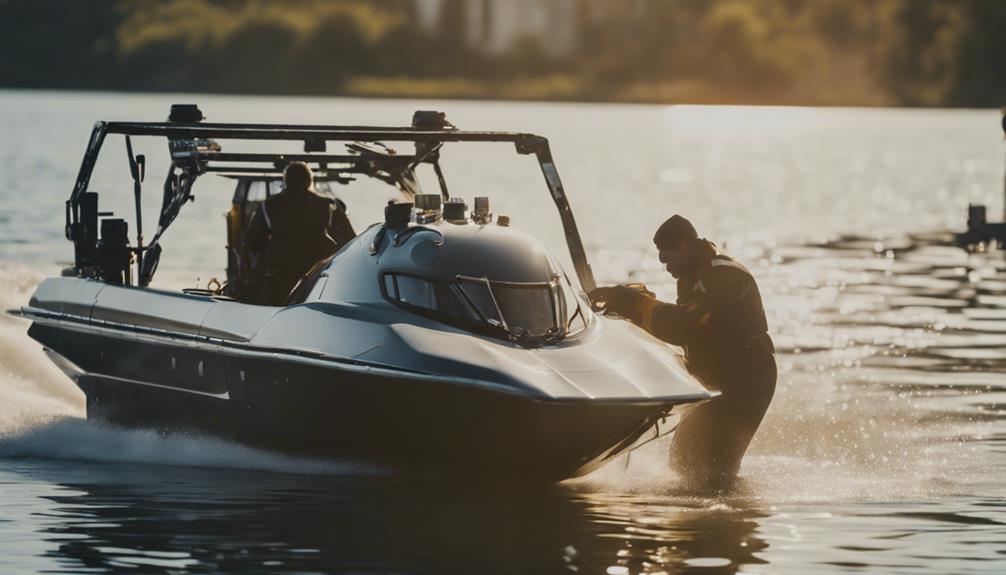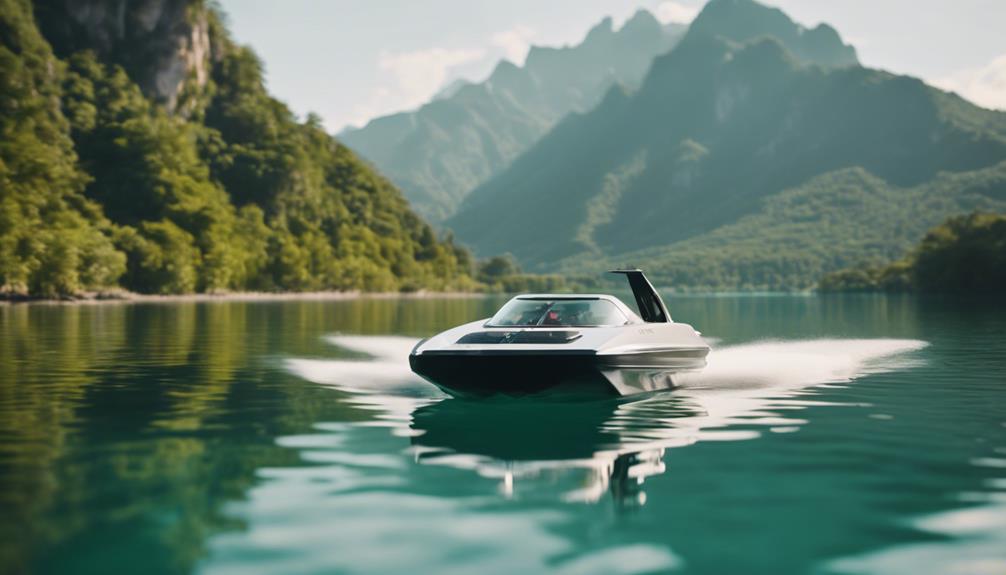Yes, jet boats are generally considered high maintenance compared to other types. You'll need to change the engine oil every 100 hours and routinely inspect the fuel system and electrical components to prevent issues. Regular checks for debris in the jet drive are essential to avoid impeller damage. Plus, the higher fuel consumption adds to overall operational costs. While their unique capabilities make them great for shallow waters, the extra upkeep can be a hassle. If you're curious about specific maintenance tips and best practices, you might find valuable insights below.
Key Takeaways
- Jet boats require more frequent maintenance compared to sterndrive boats due to potential debris clogging and impeller inspections.
- Engine oil changes are needed every 100 hours, necessitating regular attention to engine health.
- Higher fuel consumption leads to increased operational costs, impacting overall maintenance expenses.
- Regular checks on the fuel system and sacrificial anodes are essential to prevent significant operational issues.
Understanding Jet Boat Mechanics
Understanding jet boat mechanics helps you appreciate how their unique design allows for impressive performance and maneuverability on the water. At the heart of a jet boat is the jet drive, which utilizes a jet pump to propel the boat forward. This system draws water from underneath and expels it through a nozzle, creating thrust that enables rapid acceleration.
For boat owners, this means steering in shallow water becomes a breeze, as jet boats can operate effectively in just 3 inches of water. The shallow draft and the absence of external propellers reduce drag, making these boats incredibly agile.
Steering is an essential feature of jet boats, achieved through a movable nozzle that directs the water flow. This design not only enhances control over the boat's direction but also contributes to its overall safety.
Unlike traditional boats, jet boats have a lower risk of propeller damage due to their enclosed jet drive impeller, allowing you to confidently explore areas where other boats might struggle.
Understanding jet boat mechanics is key to maximizing your experience on the water and ensuring that you enjoy all the benefits these vessels offer.
Maintenance Requirements for Jet Boats
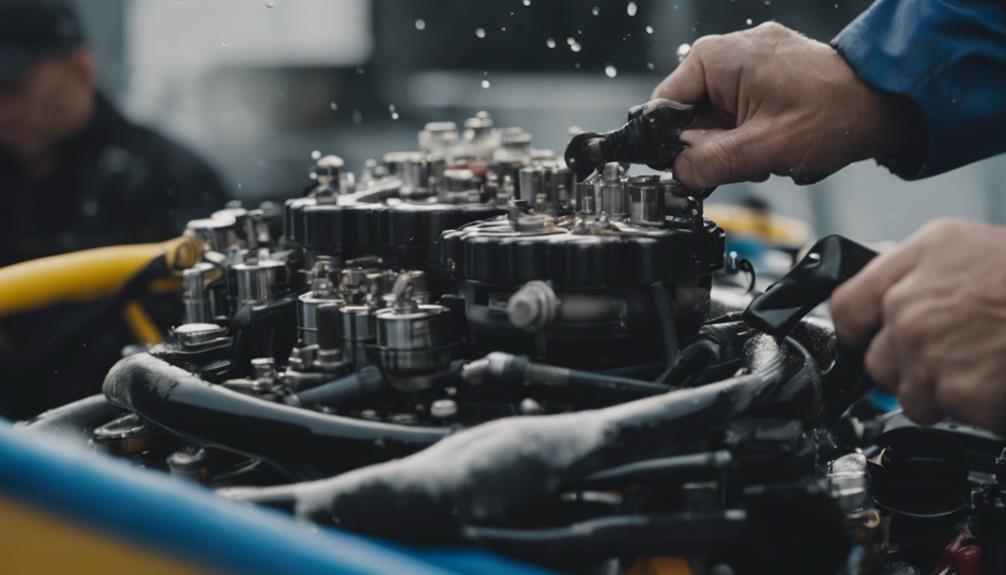
Jet boats rely on proper maintenance to keep their impressive performance and maneuverability intact. You'll want to change the engine oil every 100 hours, using Yamalube 4W 10W-40 Oil specifically designed for marine engines. This guarantees your engine runs smoothly while maximizing efficiency.
Frequent inspections of the fuel system are essential, as fuel issues can cause significant problems. Consider using non-alcohol-based fuel stabilizers to help prevent moisture-related damage. You should also conduct visual inspections before and after each use, checking for signs of wear on sacrificial anodes and electrical systems to mitigate corrosion risks.
Jet drive maintenance can be more demanding since debris ingestion can damage the impeller. Regular checks and cleanouts are necessary to maintain functionality. Additionally, keep in mind that jet boats generally consume more fuel than propeller-driven boats, which can lead to increased operational costs. It's important to factor these maintenance expenses into your budget to guarantee your jet boat stays in top shape for years to come.
Advantages and Disadvantages
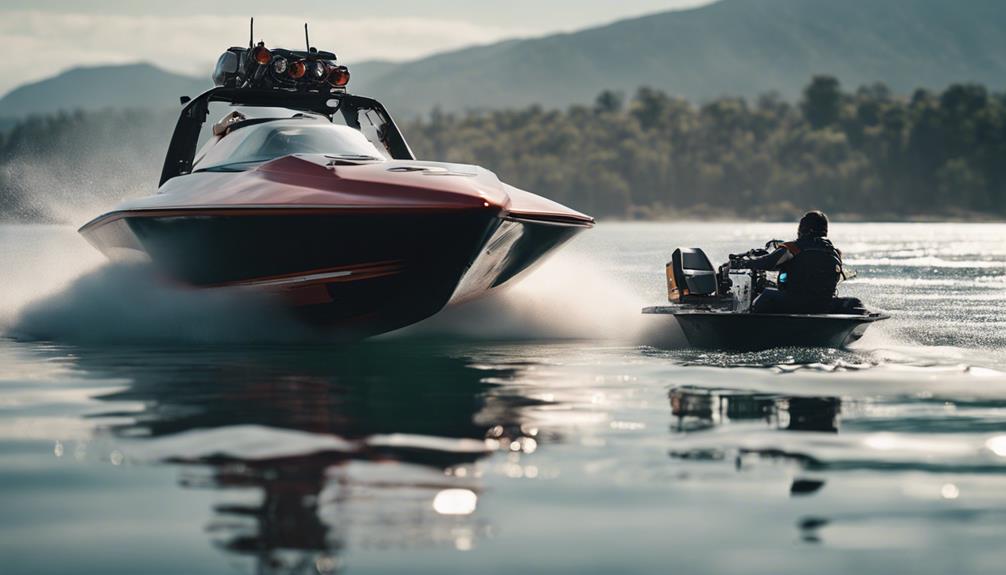
Weighing the advantages and disadvantages of jet boats reveals a mix of impressive features and maintenance challenges that every owner should consider. One of the notable advantages is the reduced risk of propeller damage in shallow waters, making jet boats ideal for maneuvering tricky environments.
However, this benefit comes with higher fuel consumption compared to propeller-driven boats, which can increase your overall maintenance costs. Jet boats often require more frequent engine maintenance due to their higher RPMs, leading to increased wear and tear. You'll also need to be mindful of the impeller system, which can clog with debris, necessitating regular inspections and cleanings.
While handling in open water can be a breeze, you might face challenges at low speeds, especially during docking maneuvers. This can complicate operations and possibly lead to more maintenance on steering components.
Ultimately, owning a jet boat means balancing its thrilling performance with the commitment to regular upkeep. If you're willing to invest time and resources, the advantages can outweigh the disadvantages, but it's crucial to be prepared for the unique maintenance demands of these vessels.
Comparing Jet Boats and Sterndrives
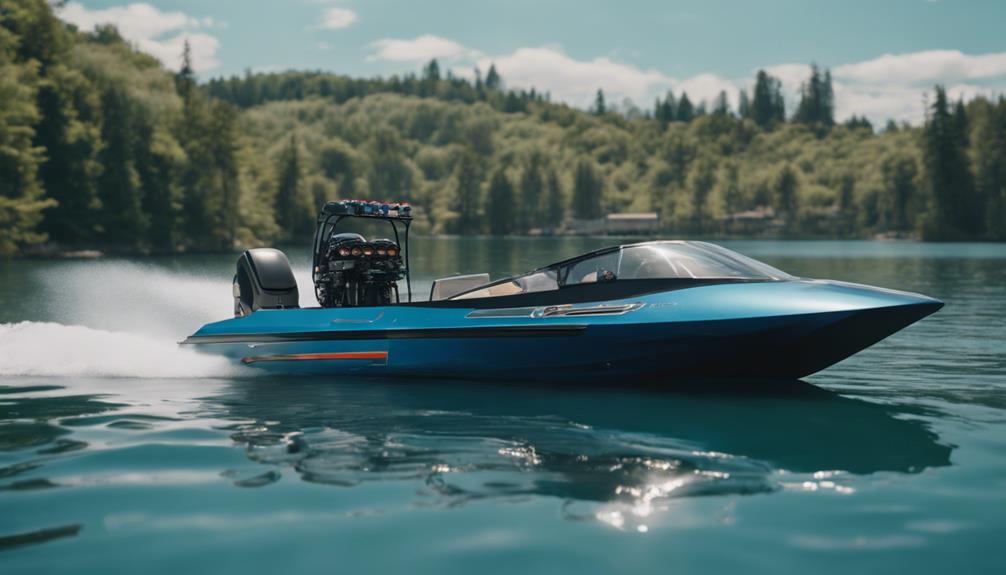
When considering maintenance and performance, comparing jet boats and sterndrives reveals distinct advantages and challenges that can impact your ownership experience.
Jet boats typically require more frequent maintenance because they're prone to clogging from debris, necessitating regular impeller inspections. In contrast, sterndrive systems offer a more straightforward maintenance routine due to their robust outdrive design.
Performance-wise, sterndrive boats allow you to make trim adjustments for optimized thrust angles. This can enhance your handling and speed, especially in varying sea conditions. Jet boats, with their non-trimmable nozzles, might struggle in such scenarios, limiting your adaptability.
However, jet boats excel in shallow draft capabilities, letting you navigate shallow waters without worrying about damaging external propellers, a vulnerability that sterndrive boats face.
Low-speed maneuvering can also be more challenging in jet boats, as they rely on water intake for thrust. Sterndrive boats, with their rudder effect, provide better tracking at slower speeds.
While both systems have unique benefits and challenges, understanding these differences will help you make an informed decision that aligns with your boating style and maintenance preferences.
Tips for Efficient Maintenance
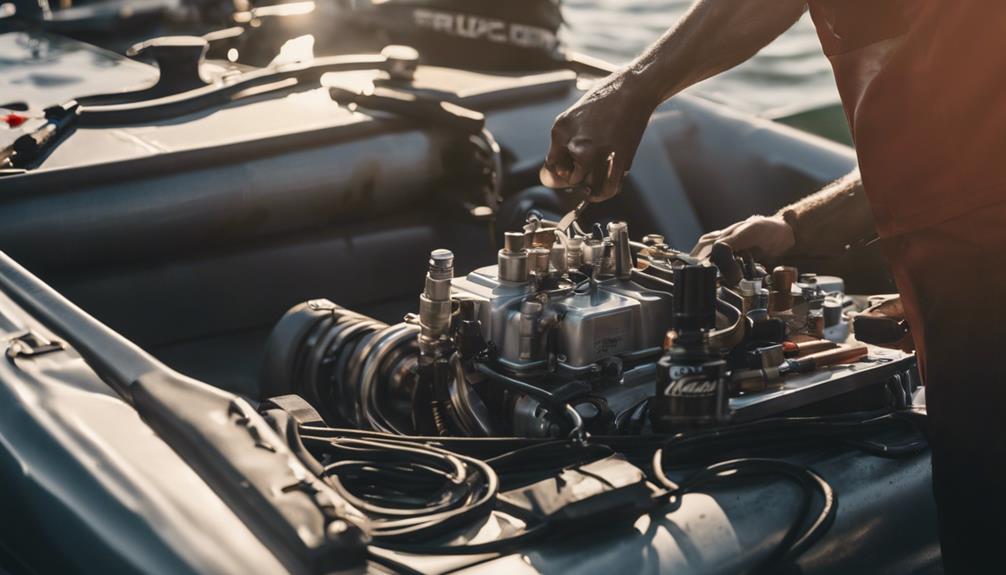
Efficient maintenance of your jet boat guarantees peak performance and extends its lifespan, so follow these essential tips to keep it in top shape.
First, remember to change your engine oil every 100 hours using Yamalube 4W 10W-40 Oil. This keeps your engine running smoothly and helps prevent costly repairs.
Before each outing, conduct thorough pre-launch checks. Inspect components like sacrificial anodes and electrical systems to catch potential issues early.
After each trip, rinse your boat with clean water, especially if you've been in saltwater, to prevent corrosion and protect crucial parts.
Regularly inspect and clean filters, battery connections, and electrical connection blocks to guarantee efficient operation.
Additionally, keep a maintenance log to track inspections and repairs; this promotes proactive upkeep and helps you spot patterns that may require attention.
Frequently Asked Questions
Are Jet Boats Difficult to Maintain?
Jet boats can be challenging to maintain due to their complex systems and the need for frequent inspections. Regular cleanings, oil changes, and attention to debris are essential to keep everything running smoothly and efficiently.
What Are the Downsides of Jet Boats?
When considering jet boats, you'll find downsides like higher fuel consumption, challenging low-speed handling, and complicated maintenance access. Regular cleaning's essential to prevent pump clogging, which could lead to costly repairs if neglected.
How Long Do Jet Boat Engines Last?
Jet boat engines can last a whopping 2,000 hours if you pamper them with proper maintenance. Regular oil changes and careful driving habits are your secret weapons for keeping that engine roaring strong for years!
What Are the Risks of Jet Boats?
When you use jet boats, you face risks like engine damage from debris, increased wear from high RPMs, and handling challenges. You might also experience thrust loss, which can lead to over-revving and potential harm.
Do High Fuel Efficiency Jet Boats Require Less Maintenance?
When it comes to jet boats fuel efficiency truth, it’s important to consider maintenance. High fuel efficiency jet boats do require less maintenance compared to traditional boats. With improved technology and design, these boats are built to last longer and require fewer tune-ups, saving time and money in the long run.
Conclusion
In the world of boating, jet boats are like sleek arrows, cutting through water with grace. While they demand attention and care, the thrill they offer is worth the effort.
Think of maintenance as tuning a fine instrument; it keeps the melody of your adventures harmonious. By understanding their needs and following efficient tips, you can guarantee your jet boat remains a trusted companion, ready to glide into the sunset whenever you choose.

